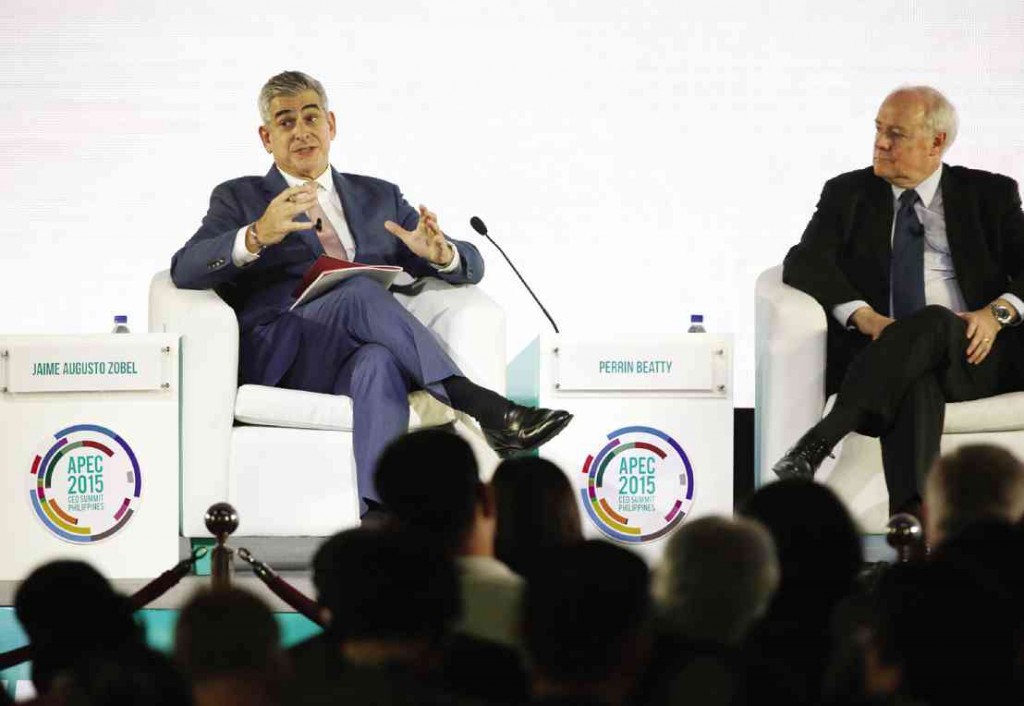Regardless of who will become the next President, the Philippines will continue to grow.
This is according to Jaime Augusto Zobel de Ayala, chair and chief executive officer of 182-year-old Ayala Corp., who said global trends would force economies like the Philippines to progress.
Thus the Philippines is bound to level up and build on—rather than backtrack from—the economic and governance gains achieved in the last six years under the administration of President Benigno Aquino III.
“We tend to be optimists in the Ayala group, not pessimists. We believe in the country and we believe that irrespective of who gets chosen into a leadership position, the country will continue to progress,” Zobel said.
“The reason why I believe that is that we’re interlinked globally now. From a standards point of view, from an economic point of view, the world looks at us and we can not escape and be in isolation from the trends that are taking place. I think, generally, these trends have taken standards up—(such as in) governance and leadership. You will have some better leaders, some worse ones. But we have shown as an economy under the current leadership that we have evolved as a country tremendously and moved forward. I don’t see the clock going backwards on that,” he added.
Zobel shared his views on the national and local elections in May during a press briefing after Ayala’s stockholders’ meeting on Friday.
Various surveys show that leading the race to become President is Davao City Mayor Rodrigo “Digong” Duterte, who despite his lack of funds and unorthodox demeanor has received snowballing support because of his agenda against crime.
Running against Duterte are Vice President Jejomar Binay, Senators Grace Poe and Miriam Defensor-Santiago and administration candidate and former Interior Secretary Manuel “Mar” Roxas.
“Different leaders have different styles, different points of emphasis. But all of them will have to conform to the changing economic landscape that’s increasingly interrelated, where information flows much more easily. We are all forced to ride this boat,” Zobel said.
Within the 21-member Asia-Pacific Economic Cooperation (Apec), of which the Philippines is part, Zobel said everyone was forced to move up and align to global standards.
“I guess the trend will take us forward. Leadership can push us faster to that path or slower, but we will move forward,” Zobel said.
Apec is a regional economic forum established in 1989 with the goal of creating greater prosperity for the people of the region by promoting balanced, inclusive, sustainable, innovative and secure growth and by accelerating regional economic integration.
Notwithstanding political uncertainties, Ayala Corp. gave its stockholders on Friday a picture of how the country’s oldest conglomerate will evolve over the next five years.
The company aims to double its net income to P50 billion by 2020, coming from P22.3 billion net profit in 2015. It also aspires to boost its Southeast Asian footprint and grow businesses outside its four largest business units today—banking (Bank of the Philippine Islands); property (Ayala Land), telecommunications (Globe Telecom) and water utility (Manila Water).
In another vote of confidence in the country, the Ayala Group has announced plans to boost investments in manufacturing, a job-generating sector that the country urgently needs to grow.
It signed a partnership deal with Austria-based KTM to set up in Laguna a motorcycle manufacturing hub—the first in Southeast Asia for this brand—the bulk of the production of which will be for export. About 70 percent of 20,000 units to be produced in the first year will be shipped out to China.
Zobel said the next administration would inherit a government with a strong balance sheet and investment grade rating.
This substantial balance sheet gives the next administration a sizable war chest to “boldly start building up the infrastructure the country needs to take us to the next couple of decades.”
At the same time, Zobel said the next President should focus on attracting more foreign direct investments (FDIs).
“It would be an interesting challenge for the next administration to push hard on the FDI side because we’ve got great consumption taking place in the country (but) we’re lacking in the investment-led growth from abroad. If we can get that side of the equation sorted out and make the country an attractive place, then it’s a very exciting economic equation,” Zobel said.
“Our move into the manufacturing space is one which hopefully others will follow and I think it bodes well for the country,” he added.
Zobel also hopes the next administration will continue the public-private partnership tack in infrastructure-building.
Asked what kinds of projects he would like to see in the pipeline, Zobel said: “We need tremendous resources to pour into the road network in greater Metro Manila, in mass transportation system and into any component of the framework needed to move in and out of the country, that’s of course aviation and airports. Beyond that, construction of power and telecommunication is needed to keep 100 million people connected to the world, being able to be productive and contribute to the economy.”
